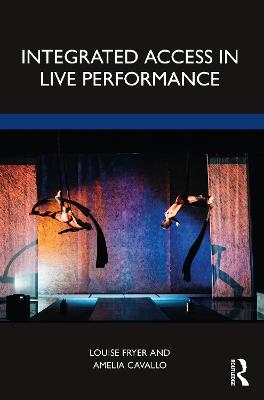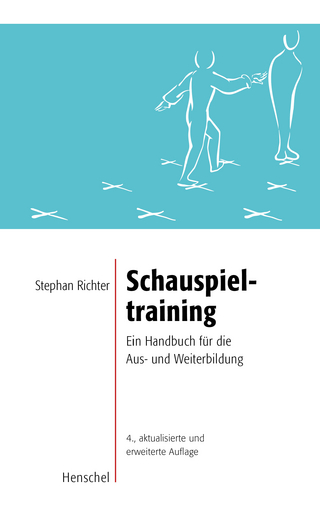
Integrated Access in Live Performance
Routledge (Verlag)
978-0-367-19072-9 (ISBN)
Twelve per cent of UK theatregoers have a disability. This compares with 18% of the UK’s adult population. Directors can help build audiences as diverse as the population at large by making their art accessible to all. Live performances are increasingly being made accessible to people with sensory impairments not only to satisfy equality laws and the requirements of funding bodies, but also in the interest of diversity and as a catalyst for creativity. But how do you ensure you don’t throw out the access baby with the artistic bathwater?
This book draws on the results of the Integrated Access Inquiry: Is It Working? A qualitative study with 20 theatremakers from around the UK, it was commissioned by Extant Theatre – the UK’s leading company of blind and visually impaired people, and combines feedback from disabled audiences with advice from the creative teams who have experimented with integrating access.
It discusses the challenges and opportunities of working with disabled actors and building in audience access even before rehearsals begin. It offers strategies, case studies and a step-by-step guide to help creative people integrate access into their live performance for the benefit of all.
Louise Fryer (she/her) is one of the UK’s most experienced describers. She has described at the National Theatre since it started offering AD in 1993. For over 20 years Louise was a presenter for BBC Radio and helped develop the pilot BBC TV Audio Description Service (AUDETEL). She has described films and was the accessibility advisor for the BAFTA-nominated Notes on Blindness (2016) and writes audio guides for museums and galleries. Louise has a PhD in experimental psychology. Between 2018 and 2020 she was a Senior Teaching Fellow in the Centre for Translation Studies (CENTRAS) at University College London. She has written extensively on Audio Description and is the author of An Introduction to Audio Description: A Practical Guide (2016, Routledge). Amelia Cavallo (they/them) is a queer, blind theatre practitioner and academic. Their performance practice is multi-disciplinary, spanning mediums such as aerial circus, drag and burlesque. Amelia also works as an access consultant with a focus on integrated audio description. In their academic work, Amelia is a university lecturer and workshop facilitator. They are also in the final stages of their PhD, which focuses on intersections of gender, disability and sexuality. With their wxfe Al Lander, they co-founded Quiplash, a creative performance and consulting project that takes space for disabled people across the LGBTQQIA+ spectrum.
List of illustrations
Preface
Acknowledgements
List of abbreviations
List of contributors
Introduction
1 Diversity and inclusion: The goals of access
2 Towards a social model of access
3 Traditional access modes: How they are delivered
4 Traditional access models – Are they working?
5 Integrated access
6 Accessible filmmaking – A model to follow?
7 Art and access
8 Access for all?
9 Case studies
10 Taking the first steps
11 Concluding remarks
Index
| Erscheinungsdatum | 23.11.2021 |
|---|---|
| Zusatzinfo | 3 Halftones, black and white; 3 Illustrations, black and white |
| Verlagsort | London |
| Sprache | englisch |
| Maße | 156 x 234 mm |
| Gewicht | 408 g |
| Themenwelt | Kunst / Musik / Theater ► Theater / Ballett |
| ISBN-10 | 0-367-19072-9 / 0367190729 |
| ISBN-13 | 978-0-367-19072-9 / 9780367190729 |
| Zustand | Neuware |
| Informationen gemäß Produktsicherheitsverordnung (GPSR) | |
| Haben Sie eine Frage zum Produkt? |
aus dem Bereich


